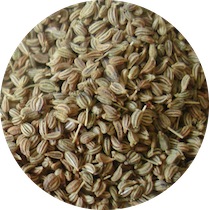Botanical Name: Trachyspermum ammi (also Carum copticum)
Common names: Ajwain, Ajavayan, Ajowanj, Carum, Carom, Yavani, Yawani, Omum
Family: Apiaceae
Plant Parts used: seeds
Description and Habitat
The plant is an erect, glabrous, branched annual herb. It grows up to 1 metre (about 3 feet) in height and features tiny white terminal flowers that develop into small, greyish-brown oval-shaped seeds that are ready for harvest by the end of Winter or early Spring. The seeds are similar in appearance to caraway seeds, and have vertical stripes on their outer surface. Ajwain is cultivated throughout most of India.
History, Folklore & Ritual Usage
Ajwain seeds were used regularly in ancient Egypt as both a medicine and a culinary spice. They have long been used in traditional Ayurvedic medicine for various ailments, including flatulence, indigestion, as a cough remedy, asthma, and as a germicide and antiseptic. Ajwain seeds mainly feature in savoury Indian, Pakistani, and Middle-Eastern cooking. In order to keep the fragrance and flavour intact, the seeds are generally crushed and added to dishes during the final stage of cooking. Ajwain can be used in Pagan and Wiccan rituals as a talismanic spice (often as part of a combination in a pouch or juju bag) to help dispel illnesses or misfortune; included as an incense ingredient to encourage harmony and drive away evil forces; used to empower or increase the potency of a spell (particularly in healing or empowerment spells).
Main Constituents
- thymol
- oleic acid
- linoleic acid
- gamma-terpinene
- p-cymene
- palmitic acid
- xylene
Actions
- analgesic
- antinociceptive
- antioxidant
- stimulant
- antiseptic
- antimicrobial
- antibiotic
- antifungal
- anticholinergic
- aphrodisiac
- anti-inflammatory
- carminative
- antispasmodic
- tonic
Indications
1. GASTROINTESTINAL TRACT
- Flatulence
- Indigestion
- Nausea
- Colic
- Constipation
- Reflux
- Hiccups
2. RESPIRATORY TRACT
- Asthma
- Coughing
- Sinusitis
- Earache
- Congestion
3. EXTERNAL USE
- Rheumatism
- Arthritis
- Neuralgia
- Headache, migraine
4. PREGNANCY & CHILDBIRTH
- Improves digestion during pregnancy and lactation
- Helps with pregnancy constipation
- Tones the uterus and pelvic floor
- Increases milk production
Preparation & Dosage
- Boil a teaspoon of the seeds in a cup of water till it is reduced to half, strain and drink this water for instant relief for digestive issues.
- For sinusitis, add 2-3 tablespoons to a hot pan and dry roast the seeds until they begin to brown and you can smell their fragrant oils. Take a soft cotton handkerchief or cloth and place the seeds in it. Apply the bundle to your sinuses when it is temperate, and inhale. This method can also help with migraines.
- For arthritis or rheumatic pain, use a strong infusion of the seeds as a soak, or crush the seeds with coconut or olive oil until you have a poultice.
Cautions & Contradictions
- None listed
Click here to purchase Ajwain seeds
~~~

Megan Sheppard is an aficionado of all things plant-based, particularly if it involves herbs and tastes delicious! She works as a Herbalist specialising in nutrition, and works freelance as a natural health author and advisor. Megan’s herbalicious creations can be found at Wildflower Botanicals, a garden of organic and ethically sourced teas, chocolate, and other delights!

